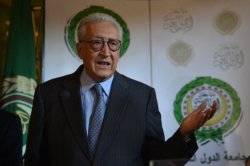Just a few weeks after admitting his task was "nearly impossible", special envoy Lakhdar Brahimi is due to meet both Syrian President Bashar al-Assad and opposition members when he travels to the war-torn country this week.
Ahead of Brahimi's visit, heavy fighting has continued across the country, including in Aleppo, where government forces targeted rebel positions on Tuesday, killing at least 12 people, activists said.
Ban Ki-moon, the UN secretary-general, announced in Bern that Brahimi would meet Assad, without providing more details about the highly anticipated visit.
Ahmad Fawzi, Brahimi's spokesman, said the envoy, selected by the UN and Arab League to replace Kofi Annan, would also meet representatives of the Syrian opposition.
"Brahimi will go to Damascus in the next few days. He will meet with President Assad and other officials, officials from the opposition, as well as representatives of civil society," Fawzi said.
According to several UN diplomats, Brahimi was expected to arrive in Damascus by Thursday.
Annan quit in August over divisions within the UN Security Council that have prevented much action to halt the deadly violence that has gripped Syria for nearly 18 months.
The head of the UN's refugee programme has told Al Jazeera that he plans to launch a new appeal for aid, estimating that another 650,000 Syrians might flee their country, in addition to the 250,000 who have already left.
Both sides accused
Syrian guns pounded rebel positions in Aleppo, the country's largest city, after a comparatively quiet morning on Tuesday.
Drinking water supplies - cut off in many areas of the city after a main pipe was blown open during fighting and air raids on Saturday - were restored after repairs, a resident told the AFP news agency.
The city is Syria's commercial hub, and its middle and upper classes were bastions of support for Assad. If the rebels took such a key city, it would give them a quasi-capital to complement the large swaths of territory they control in the north, up to the Turkish border.
In Damascus, an explosion rocked the upscale western district of Mezzeh overnight, and pro-regime fighters fought rebels in Barzeh, another wealthy neighborhood, said the Syrian Observatory for Human Rights, a Britain-based activist organization.
In Deir Az Zor province in the east, warplanes bombarded the town of Abu Kamal on the Iraqi border, killing four people, including three women.
They also hit several districts of Deir Az Zor city, where clashes broke out and rebels deployed anti-aircraft guns. Rebels recently seized an air base outside of Abu Kamal.
More than 27,000 people have been killed since the conflict erupted in March last year, according to the Observatory.
The UN puts the death toll at 20,000.
Some doctors at makeshift clinics in Aleppo have told reporters they believe as many as 80 per cent of their patients are civilians wounded by indirect shelling and unpredictable gunfire.
The European Union's top humanitarian chief, Kristalina Georgieva, said on Tuesday that both sides in the war are increasingly violating human rights law.
The Syrian government and allied militias have been accused by the UN and Western governments of numerous large-scale massacres, though the rebels are also facing fresh allegations of mass killings.
Amateur YouTube video posted on Monday showed images of 20 dead Syrian soldiers, blindfolded and handcuffed, after they were apparently executed in the northern city of Aleppo.
The UN's refugee agency has said that more than 1.2 million Syrians, over half of them children, have become internally displaced.
Brahimi pessimistic
Brahimi, who is in Cairo, said he would travel to Damascus in a few days to meet Syrian officials, but he has been unclear on whether he would be able to meet Assad himself.
Expectations that Brahimi will have any more success than Annan are low, however, and he himself warned Monday: "We cannot expect miracles."
His pessimism appears warranted, since his mission begins with the US and Russia split on how to tackle the conflict and as fighting only escalates.
Yet Ban insisted that these "intolerable circumstances" must come to an end and that "the violence must stop by both sides."
He said he understood the frustration felt by many in the face of the Security Council's apparent paralysis in dealing with the worsening crisis.
He called on "all member states [to show] a common sense of common responsibility where human rights, human dignity are abused".
"Those countries who might have influence over two parties should exercise" that influence and should work towards "a political resolution reflecting the genuine aspirations of the Syrian people".
Laurent Fabius, France's foreign minister, said his country - which has taken a lead role opposing Assad - had been assisting officials in defecting from the regime. "It's our role," he said. "Our agencies are active."
General Manaf Tlass, one of the most senior members of Assad's rule to flee Syria, said on Monday he had defected in July with the help of French special forces.
PHOTO CAPTION
UN and Arab League envoy for Syria Lakhdar Brahimi gestures during a press conference at the Arab League's headquarters in Cairo on September 10.
Aljazeera


 Home
Home Discover Islam
Discover Islam Quran Recitations
Quran Recitations Lectures
Lectures
 Fatwa
Fatwa Articles
Articles Fiqh
Fiqh E-Books
E-Books Boys & Girls
Boys & Girls  Hajj Rulings
Hajj Rulings Hajj Fatwas
Hajj Fatwas














